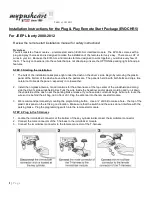
’04 Tacoma U (L/O 0309)
250
2004 TACOMA from Sep. ’03 Prod. (OM35814U)
If your engine coolant temperature
gauge indicates overheating, if you ex-
perience a loss of power, or if you hear
a loud knocking or pinging noise, the
engine has probably overheated. You
should follow this procedure...
1. Pull safely off the road, stop the ve-
hicle and turn on your emergency
flashers. Put the transmission in “P”
(automatic) or neutral (manual) and ap-
ply the parking brake. Turn off the air
conditioning if it is being used.
2. If coolant or steam is boiling out of the
radiator or reservoir, stop the engine.
Wait until the steam subsides before
opening the hood. If there is no coolant
boiling over or steam, leave the engine
running.
CAUTION
To help avoid personal injury, keep
the hood closed until there is no
steam. Escaping steam or coolant is
a sign of very high pressure.
3. Visually check to see if the engine
drive belt (fan belt) is broken or loose.
Look for obvious coolant leaks from the
radiator, hoses, and under the vehicle.
However, note that water draining from
the air conditioning is normal if it has
been used.
CAUTION
When the engine is running, keep
hands and clothing away from the
moving fan and engine drive belts.
4. If the engine drive belt is broken or the
coolant is leaking, stop the engine im-
mediately. Call a Toyota dealer for as-
sistance.
5. If the engine drive belt is O.K. and
there are no obvious leaks, you may
help the engine cool down more quickly
by running it at about 1500 rpm for a
few minutes with the accelerator pedal
lightly depressed.
6. Check the coolant reservoir. If it is dry,
add coolant to the reservoir while the
engine is running. Fill it about half full.
CAUTION
Do not attempt to remove the radiator
cap when the engine and radiator are
hot. Serious injury could result from
scalding hot fluid and steam blown
out under pressure.
7. After the engine coolant temperature
has cooled to normal, again check the
coolant level in the reservoir. If neces-
sary, bring it up to half full again. Seri-
ous coolant loss indicates a leak in the
system. You should have it checked as
soon as possible at your Toyota dealer.
If your vehicle overheats
Summary of Contents for Tacoma 2004
Page 8: ...04 Tacoma U L O 0309 8 2004 TACOMA from Sep 03 Prod OM35814U...
Page 24: ...04 Tacoma U L O 0309 24 2004 TACOMA from Sep 03 Prod OM35814U...
Page 110: ...04 Tacoma U L O 0309 110 2004 TACOMA from Sep 03 Prod OM35814U...
Page 130: ...04 Tacoma U L O 0309 130 2004 TACOMA from Sep 03 Prod OM35814U...
Page 156: ...04 Tacoma U L O 0309 156 2004 TACOMA from Sep 03 Prod OM35814U...
Page 182: ...04 Tacoma U L O 0309 182 2004 TACOMA from Sep 03 Prod OM35814U...
Page 202: ...04 Tacoma U L O 0309 202 2004 TACOMA from Sep 03 Prod OM35814U...
Page 230: ...04 Tacoma U L O 0309 230 2004 TACOMA from Sep 03 Prod OM35814U...
Page 270: ...04 Tacoma U L O 0309 270 2004 TACOMA from Sep 03 Prod OM35814U...
Page 290: ...04 Tacoma U L O 0309 290 2004 TACOMA from Sep 03 Prod OM35814U...
Page 306: ...04 Tacoma U L O 0309 306 2004 TACOMA from Sep 03 Prod OM35814U...
Page 330: ...04 Tacoma U L O 0309 330 2004 TACOMA from Sep 03 Prod OM35814U...
Page 336: ...04 Tacoma U L O 0309 336 2004 TACOMA from Sep 03 Prod OM35814U...















































